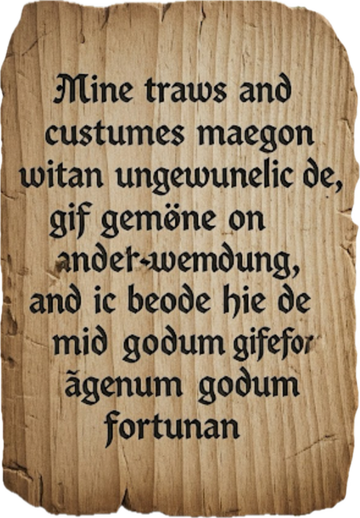“Greetings to the good people of Bognor.
My name is Bucge.
I am the guardian of my people and keeper of the book of noble earthly truths.
My kindred have honoured me with the title of the majestic bēce or bōc, the Queen of the Woods, which is revered and greatly sustains us. You will know this as the beech tree, which gives us shelter and firewood by its branches, feeds us and our livestock by its mast and the means to record our customs by its bark.
More than 1,300 winters have passed since we travelled from across the sea and made this place our home.
My traditions and customs may seem strangely familiar to you, if made clear in translation, and I offer them to you with good grace for your own good fortune”.

- “Be secure in your hearts and protect each other.
- Take good care of your health and use your fitness of mind to make good choices.
- Listen carefully to the stories of your kinfolk for they will help with your understanding.
- Learn from each other and build great agility and resilience together.
- Stand before each other and swear allegiance to your shared enrichment.
I wish you well in your pursuance of truth, happiness and long life and thank you for taking care of this place we call home”.
Bognor Regis is a seaside coastal resort located within West Sussex in the South of England and one of the oldest recorded Saxon place names in Sussex. In a document of 680AD it is referred to as Bucgan'ora meaning Bucge's shore, or landing place. In Anglo Saxon, Bucge means 'book' or in Auld Englisċ 'beech tree'.
In more recent times it was know as just ''Bognor'' and up until the 18th century, was just a fishing village and was also used by smugglers.
A.D. 1005. This year died Archbishop Elfric; and Bishop Elfeah succeeded him in the archbishopric. This year was the great famine in England so severe that no man ere remembered such. The fleet this year went from this land to Denmark, and took but a short respite, before they came again.
A.D. 976. This year was the great famine in England.
A.D. 793. This year came dreadful fore-warnings over the land of the Northumbrians, terrifying the people most woefully: these were immense sheets of light rushing through the air, and whirlwinds, and fiery, dragons flying across the firmament. These tremendous tokens were soon followed by a great famine: and not long after, on the sixth day before the ides of January in the same year, the harrowing inroads of heathen men made lamentable havoc in the church of God in Holy-island, by rapine and slaughter.
A.D. 678. This year appeared the comet-star in August, and shone every morning, during three months, like a sunbeam.
A.D. 671. This year happened that great destruction among the fowls.
A.D. 664. This year the sun was eclipsed, on the eleventh of May; and Erkenbert, King of Kent, having died, Egbert his son succeeded to the kingdom. Colman with his companions this year returned to his own country. This same year there was a great plague in the island Britain, in which died Bishop Tuda, who was buried at Wayleigh—Chad and Wilferth were consecrated—And Archbishop Deus-dedit died.
B C. 60. Sixty winters ere that Christ was born, Caius Julius, emperor of the Romans, with eighty ships sought Britain. There he was first beaten in a dreadful fight, and lost a great part of his army. Then he let his army abide with the Scots (6), and went south into Gaul. There he gathered six hundred ships, with which he went back into Britain. When they first rushed together, Caesar's tribune, whose name was Labienus (7), was slain. Then took the Welsh sharp piles, and drove them with great clubs into the water, at a certain ford of the river called Thames. When the Romans found that, they would not go over the ford. Then fled the Britons to the fastnesses of the woods; and Caesar, having after much fighting gained many of the chief towns, went back into Gaul (8).
((B.C. 60. Before the incarnation of Christ sixty years, Gaius Julius the emperor, first of the Romans, sought the land of Britain; and he crushed the Britons in battle, and overcame them; and nevertheless he was unable to gain any empire there.))


